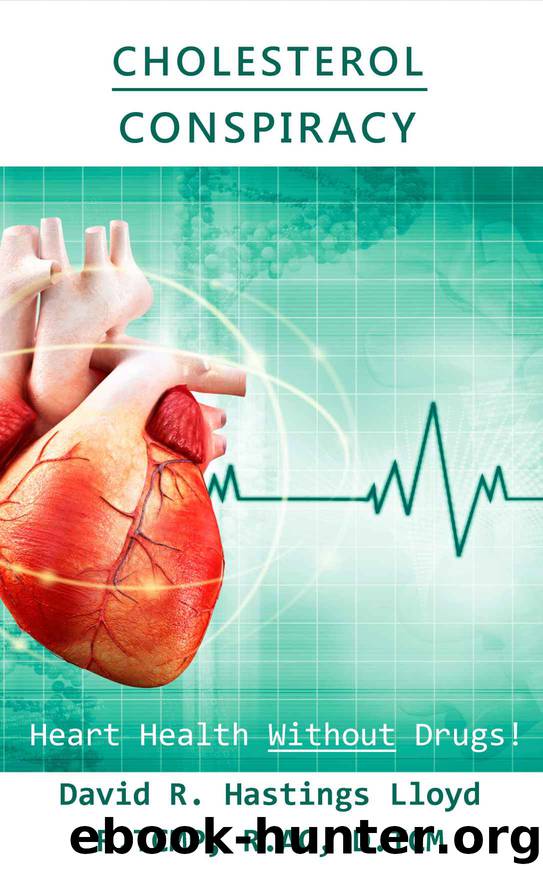Cholesterol Conspiracy: Heart Health Without Drugs! (Better Your Life) by David R. Hastings Lloyd

Author:David R. Hastings Lloyd [Lloyd, David R. Hastings]
Language: eng
Format: azw
Publisher: cranemedicine.com
Published: 2013-11-16T16:00:00+00:00
Stress:
People have had an intuitive sense that stress and heart disease are related for centuries. However, as in many areas of our lives in the later-half of the twentieth century, we have forgotten our instincts and trusted science to solve our problems for us. It may have been a step backward. Well, science is finally beginning to catch up with how we have felt for hundreds of generations. Stress is definitely not good for your heart.
When we use the term “stress” we are looking at a minimum of two variations in the definition. Though you cannot separate the mind and body, research generally lists (1) physical and/or (2) emotional stress relating to heart disease. Most research on stress and heart disease is focused on physical stress, but your head is attached to your body. So the two concepts don’t really differ that much.
Stress leads to heart disease in at least two ways.
Initially your mind and body collectively experience emotional stress, which if overwhelming enough can lead to a heart attack. However, over time, longer periods of stress also add up and they can lead to a physical accumulation of health problems. A useful analogy is to think of your body like a car. If you run it at 100% of it is working capacity and under a maximum load for years, the engine breaks down.
How does this impact your heart? Think about the last time you got bad news, or had a close call driving on the highway. Think of the blood pressure & heart rate increase which you experienced. These two elements alone, over time, cause significant wear and tear on your cardiovascular system. Now, multiply these effects over years. It is also clear that you can’t really separate the mind and the body that easily when it comes to stress.
Physical Stress
In a very mechanical way, physical stress places measurable and reproducible demands on the heart. For example, the last time you exercised your heart rate increased. This type of physical stress is generally thought of as good. Conversely, lack of physical stress (i.e., a sedentary lifestyle) is considered a major risk factor for heart disease. Lack of physical exercise is also stressful for the body. So in general “stress” in the form of light exercise is considered to be good for the heart, as long as your exercise intensity is kept at a reasonable level.
Exercise that is too intense (marathons and extreme endurance for example) can place demands on the heart muscle that the coronary arteries cannot meet, and the heart becomes ischemic. This means the cells of the heart are starved of oxygen and they may die. The ischemic heart muscle can cause either angina (chest pain), or a heart attack (death of cardiac muscle).
So physical stress -- that is, exercise -- is mostly very good for you, and is generally to be encouraged. But if exercise is extraordinarily excessive, the physical stress it causes can actually cause heart disease. It is very difficult to get to this level.
Download
This site does not store any files on its server. We only index and link to content provided by other sites. Please contact the content providers to delete copyright contents if any and email us, we'll remove relevant links or contents immediately.
Men In Love by Nancy Friday(5232)
Everything Happens for a Reason by Kate Bowler(4732)
The Immortal Life of Henrietta Lacks by Rebecca Skloot(4572)
Why We Sleep by Matthew Walker(4434)
The Sports Rules Book by Human Kinetics(4379)
Not a Diet Book by James Smith(3410)
The Emperor of All Maladies: A Biography of Cancer by Siddhartha Mukherjee(3145)
Sapiens and Homo Deus by Yuval Noah Harari(3064)
Day by Elie Wiesel(2779)
Angels in America by Tony Kushner(2652)
A Burst of Light by Audre Lorde(2597)
Endless Forms Most Beautiful by Sean B. Carroll(2473)
Hashimoto's Protocol by Izabella Wentz PharmD(2371)
Dirty Genes by Ben Lynch(2313)
Reservoir 13 by Jon McGregor(2300)
Wonder by R J Palacio(2203)
And the Band Played On by Randy Shilts(2197)
The Immune System Recovery Plan by Susan Blum(2057)
Stretching to Stay Young by Jessica Matthews(2036)
